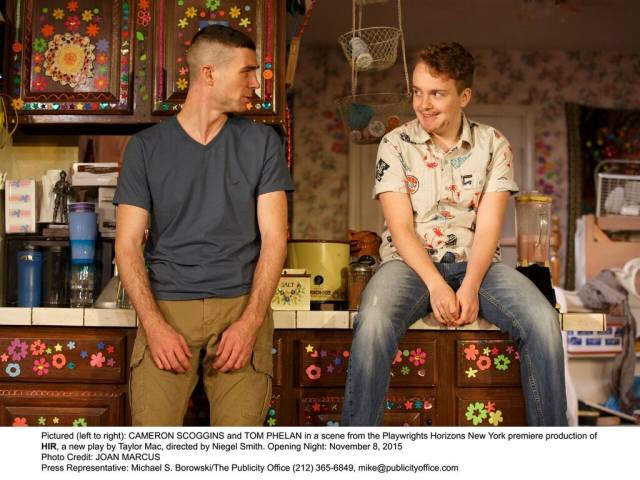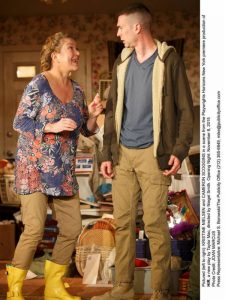
 Hir, Taylor Mac’s new play, now extended again at Playwrights Horizons, is sending critics and audiences into a frenzy, and it isn’t hard to understand why. With crackling humor, razor wit, trainwreck voyeurism and over-the-top physical performances, it's not just a play, it’s an education.
Hir, Taylor Mac’s new play, now extended again at Playwrights Horizons, is sending critics and audiences into a frenzy, and it isn’t hard to understand why. With crackling humor, razor wit, trainwreck voyeurism and over-the-top physical performances, it's not just a play, it’s an education.
In the wake of a stroke that leaves her abusive husband largely incapacitated, Paige is finally free to forge a new world and new identity with her youngest child Max, who is transitioning from female to male. Their new world order means enlightenment and freedom -- not only from gender norms, but to embrace fluidity and chaos, a stark contrast from the clean, rigid order of the father’s patriarchal abuse and oppression. But there’s a hiccup in their bold march into the future, the reappearance of Paige’s firstborn, Isaac, who returns home after being dishonorably discharged from the military. Cameron Scoggins is astounding in his no-holds-barred performance as Isaac, who desperately wants to recapture his nostalgic reimagining of home, only to find that not only is home nothing like he left it, there may not be a place for him there.
Scoggins chatted with me about getting into the groove of such a physical play, coping with audiences, and how much like life itself, the characters in the play all battle furiously to control the narrative and stake a claim as the protagonist in their own story.
 First, can you just tell me a little bit about how you got involved with the project?
First, can you just tell me a little bit about how you got involved with the project?
The director [Niegel Smith] actually emailed me maybe, well, four or five months before the project was even going to start rehearsals. They were doing a reading at Playwrights, and Niegel asked if I wanted to come and read for the part and try it out, and I read the script and thought it was hilarious and amazing, so I did that and it was actually Kristine [Nielsen, who plays Paige] and Dan [Oreskes, who plays the father, Arnold] were both at that reading too. And then we did the reading and then they offered me the part which was wonderful.
Were Kristine and Dan already on board?
I believe Kristine was? She had done previous readings or workshops of the script as well. And I think she was always in mind, in Taylor and Niegel's mind too to play the part of Paige. And the wonderful casting people at Playwrights -- Alaine [Alldaffer] and Lisa [Donadio] -- both thought of Dan for the father part, which we laughed about.
It's a mixed blessing.
They even said to him, "When we read the part we immediately thought of you!" And he was like, "Well what does that mean?" (Laughs.)
Your character is such a contrast from the family matriarch, Paige, and is in certain ways so strongly set in his ideas about life and masculinity and home. Could you talk a little bit about how you developed your character?
I really do have to say, I mean, the differences in the characters the way you speak of is really, really visible right off the page, and they are written with such depth and specificity to their own nature that [the difference] really leaps off the page -- what Isaac brings into the house versus what Paige is bringing into the house. It's a complicated character because he's in the Marines and he also tried out meth, just a lot of other things going on there, and Niegel was really helpful just in the room giving Isaac obstacles. Just playing around with things in the room, 'Well for this part you have to be moving this out of the way,' or 'You can't be looking her [Kristine] in the eyes.' He would give certain different obstacles which was actually very helpful -- as much as sort of frustrating (laughs) -- throughout the process. It was helpful to work in that way on this play because there is just so much going on, besides just sitting there and talking to each other like a living room drama. Also it's just finding the machoness, the manliness, first of all what it would be like to be in the Marines, and what it would be like to be someone who went into the Marines willingly, that different lifestyle. From the suburbs of California. It was a fun character to dive into.
I was struck that at his core he's a very sympathetic character. You do see these moments of him trying to accept Max and trying to use the proper pronouns. He's not just this one-dimensional character.
Exactly, and that's what's so fun to play. He's compassionate at the same time as being sort of the macho figure in the house. He still carries with him a lot of his relationship with his younger sister, and that's still stuck in his mind and what he's most excited to get back to no matter what, whether that means his sister is now a brother or something in between. Okay, we'll work with that. It just takes a second to get used to it, but that's all. He's not truly disgusted or anything, he's not against Max's decision.
 He just isn't really given that grace period to take it all in.
He just isn't really given that grace period to take it all in.
Right, he's just expected to go with it and know everything about it.
You mention being drawn to the play because of how funny it is. A huge element of the humor seems to be the physical aspects - the play is borderline slapstick. How did you prepare for the comedic and dark physicality that the play requires? Your character is constantly running to the sink to throw-up!
I haven't counted how many times I do that, but it's up there. In the twenties I think. (Laughs) Well obviously the physicality is what's, I think, taken us the longest to finally really catch onto our own rhythm and find that with audiences. Part of what the physicality does is we can play with that and that's also playing with the tone of the play, and it was really interesting to figure out tonally where this play wanted to go and where audiences, where the journey was best served for audiences. It's interesting to feel an audience -- the first part of the play is really funny and then maybe halfway through the first act we can start to feel the audience be like, 'No, this is actually serious, and this is actually a tragic, sad thing.' But the physical nature is pretty demanding and that's taken some time to build some stamina I think for all of us. And then like I said, knowing, 'Okay, this is in my body we can reel it back a little bit, it doesn't have to be so in your face,' or 'This should be really out there.' It's been fun to play with those things, and also people laugh sometimes when they're uncomfortable, so sometimes the laughter in the play is coming out of people being uncomfortable at what's going on.
That's another element I was curious about. I wasn't really prepared for what an intimate space it would be. The audience is right in your face. My experience was that it was a very vocal audience. How does that change night by night? Do you feel that it impacts your performance?
Oh yeah, oh yeah. (Chuckles.) That's probably the biggest factor that we also talk about in the dressing room night to night. We're still learning from audience members. One thing we have realized is that some people are just not going to go with Paige. And some people aren't going to go with the men in the house. They're huge Taylor Mac fans and they may be gender-neutral, transgender themselves, they're coming in with their own feelings. Versus elderly people who are subscribers to Playwrights and they have friends who have just had a stroke, you know? There's many different feelings that come in with just the different experiences that are sitting in the chairs -- people's lives. It is very, very different from night to night. And I'll talk to some friends or audience members and they're not conscious of how different they may be from other audiences. We've had houses where the lights go down after Act Two and they don't clap. The lights come out and we come out and bow, and it's not until we start doing that that they start to clap. They just don't even know what to do at the end of the play. You're not sure who to root for, and that's the way it's supposed to be. Taylor likes to say that there isn't a main character, but every character in the play is fighting to be the main character. And that's a driving action for all of us. Which is very interesting and probably what plays into our crazy physicality, because in some instances we're literally trying to physically outdo each. That's a really nice action for an actor to play. 'Oh, I know that feeling, let’s keep tossing the ball up and see who can toss it up higher, higher.' And that's when the play really starts to sing and when people can't help but laugh I guess. That's when we get a lot of laughter, when we're really cooking.
In many ways the play is about education. I have to admit that I didn't know "hir" before the play, I did not know going into the play that it's the gender neutral form of him or her. What was your learning process like being a part of the play?
I knew the basic generalities of how we were supposed to use gender pronouns... you know, the first day in rehearsal we all said what pronoun we wanted to use, which was very interesting. I've never had to do that in a rehearsal room, but it was great, you know, because Taylor was there, Tom [Phelan, who plays Max] was there, and Tom prefers he and him, he doesn't want to go by any sort of neutrality. Like you said, when Paige gets to those speeches with the fridge magnets and she's explaining to Isaac all of the intricacies of gender pronouns, a lot of people are right there with it and are laughing ahead of time, and other people are trying to wrap their head around it as much Isaac is.
 It's like the most offbeat kindergarten class you've ever had.
It's like the most offbeat kindergarten class you've ever had.
What Niegel likes to call that section of the play -- it's homeschool. That's where Max goes to homeschool. They have books and they have the beanbag and they have things that they can draw up on the fridge. That's where homeschool is, so that's a little interesting piece, or secret I guess, of our production.
You’re a television and film actor, and also a musician, what leads you to theater at this point. Could you talk a little bit about the differences of working in these different media?
Well, I think there's always been a part of me that's been attracted to the - this is gonna sound stupid - the theatricality of theater. Pieces that really use that, such as Hir. Another play that I did at Playwrights was called the Big Meal, which is very theatrical in its own staging and essence. I find that I tend to be really attracted to pieces like that, not saying that the characters aren't real or that the acting isn't naturalism or blah blah blah, but you know, pieces that really embrace theatricality and try to do something new on stage. I always find that I can't really pass that opportunity up. And those are challenges, you know? This role has certainly been a challenge. I'm always up for something that I know is going to have be being a better actor at the end of it.
I can imagine that as rewarding as this is, it's also a challenge - exhausting.
Yeah, it's been quite an experience on both sides.
And now you guys have had your run extended again!
Yep, many and many a time. We were supposed to be done by the start of December, now we're going a full other month. I think we'll do ninety performances or something by the end. But we won't make 100, damnit. (Laughs.)
Performances of "Hir" continue through January 3 at Playwrights Horizons.